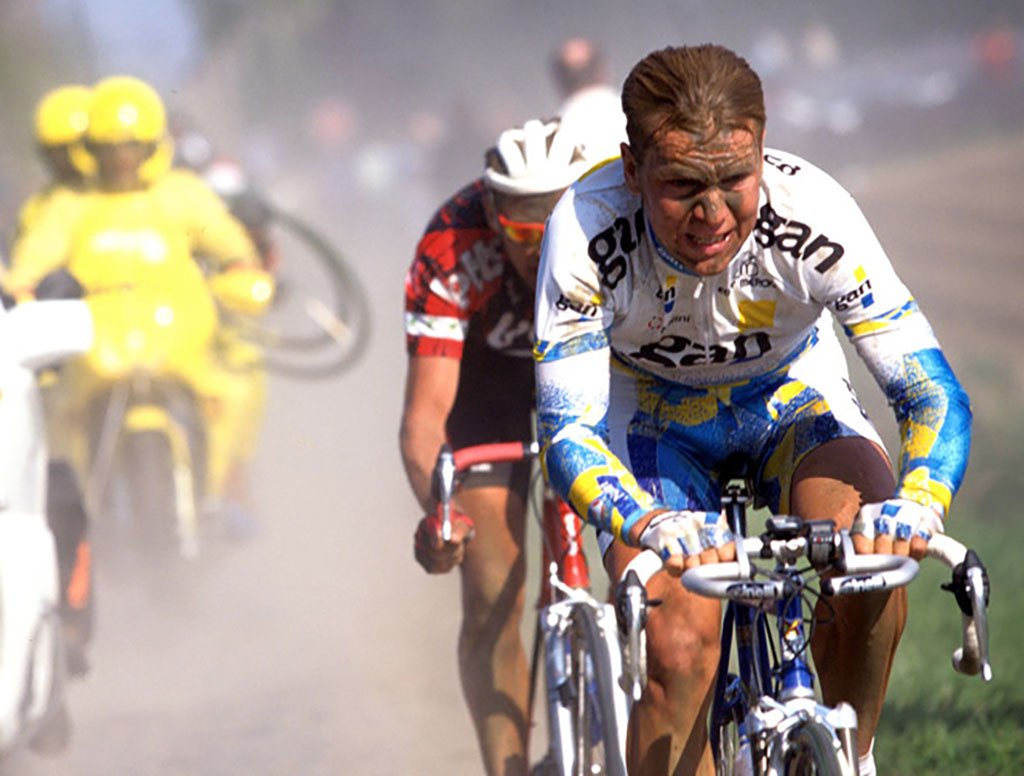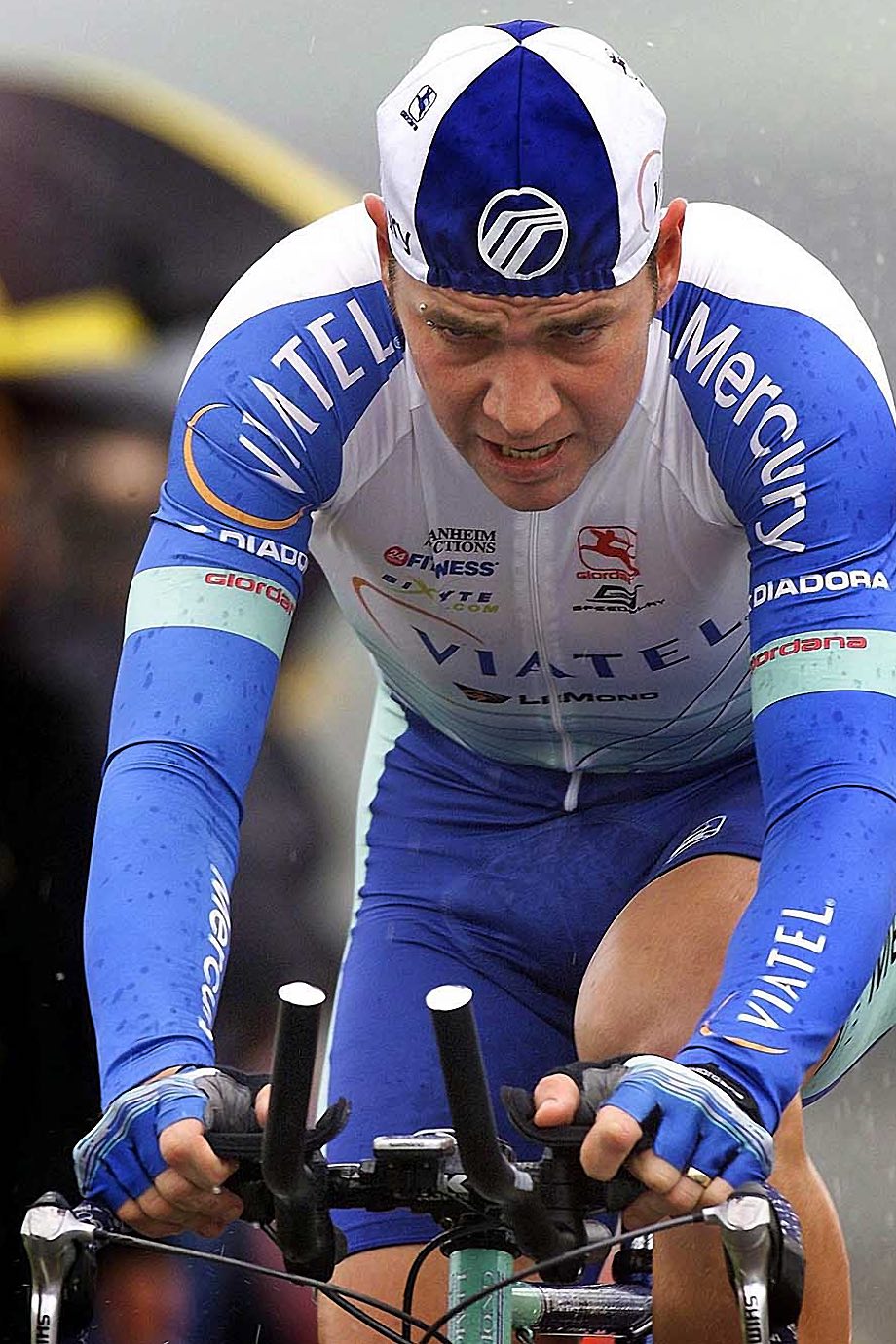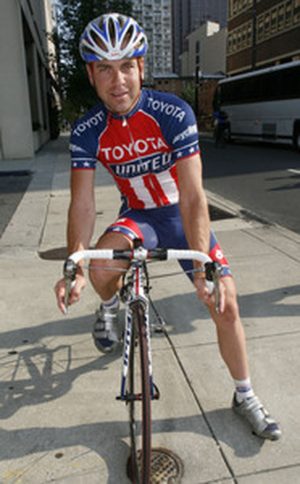It’s perhaps appropriate that his first big wins came in the Flatlands, where his father was born, and his last victory should come in the New World where he spent half of a career which criss-crossed the North Atlantic.
Henk Vogels is an Aussie through and through but his dad, Henk Vogels senior, was Dutch, a professional cyclist who immigrated to Australia and represented his new nation at the 1964 Olympics in Tokyo.
Your first win popping up on the palmarès websites is Ledegem-Kemmel-Ledegem, Belgium in 1991, a long way from home.
“My dad took me Europe to race, I won the junior Gent-Wevelgem too and I don’t know if it still runs but I also won the Junior Three days of Axel in the Netherlands which was a big race at the time.”
[Indeed it still does run now called the SPIE Three Days it was won in 2019 by Junior World Junior Road race Champion, the USA’s Quinn Simmons who won three of the four stages, ed].
And you were on the podium of the World Junior Team Pursuit Championship that year.
“I was there to ride the road race, where I finished seventh; the US guy Jeff Evanshine won with riders like Jan Ulrich, Fred Rodriguez and George Hincapie in the field.
“I had ridden the track, I won four bronzes at the Australian Track Nationals but wasn’t there to ride the team pursuit.
“Someone in the team pursuit squad was sick so they asked if I would ride, I had to borrow a bike from one of the sprinters.
“Stuey O’Grady was in the team too, the Russians won from Germany who had Danilo Hondo in the team.”
In 1994 you won the Olympia Tour in the Netherlands, that’s one fast race and notorious for the crosswinds.
“My Dad’s Dutch, from Haarlem so he’s schooled me in how to ride in the wind – and our National Coach, Heiko Salzwedel had us all pinging.”
And you were in the winning 100 kilometre TTT squad at the 1994 Commonwealth Games in Victoria, British Columbia, Canada.
“Phil Anderson was in that team too, we beat the England team by three minutes with a 1:53:19 ride. That was a world’s fastest at the time but for some reason the parcours was only 99 kilometres instead of 100 kilometres.
“Usually those events consist of a 25 kilometre out and home course covered twice but this one was 12.5 kilometres out and home which had to be covered four times, so we had eight turns instead of four.
“The race was only two days before the Worlds TTT in Sicily so we couldn’t ride both; but I flew out and rode the individual time trial in Palermo.
“It was the first of the ‘open’ championships, Chris Boardman won with Jan Ulrich third, I was eighth just behind Thierry Marie.”
You turned pro for the Dutch Novell squad in 1995 which became Rabobank in 1996.
“That was a star studded line up – Djamolidine Abduzhaparov, Edwig Van Hooydonck, Viatcheslav Ekimov, Erik Dekker, Michael Boogerd, Leon Van Bon, Fred Moncassin…”
A result which caught my eye in ’95 was second in the Stadprijs Geraardsbergen to Andre Tchmil.
“Three of us got away, Tchmil, me and Frank Vandenbroucke, who was third – that race went up the Muur 15 times.
“But my first two years as a pro were tough, they were EPO years and the race speeds were intense.”
You went to the French GAN team for 97, how did the French mentality compare to the Dutch one?
“They were similar, the Dutch are headstrong and the French are xenophobic, the world revolves around France.
“I had to learn to speak French in a hurry because no one in France spoke English then albeit there were guys on the team who spoke English, Chris Boardman, Magnus Backstedt, Jen Voigt, Eros Poli and Stuey O’Grady was there too.”

That was a good year for you: 15th in Flanders, 10th at Roubaix, 6th at Wevelgem, 2nd in the GP Denain…
“Those first two years were hard, I was getting my arse handed to me – but in my third season I had an older head and was illness and injury free.
“I was content with that ride in Roubaix but it could have been so much better, I had to unclip from my pedals with 13K to go and when I went to get going again I just couldn’t clipped back in, there was just so much mud in them.”
And you rode the Tour.
“That was hell, super-hard, but an awesome experience just the same.
“I was on lead-out duties for Stuey and Fred Moncassin who was trying for the green jersey but that went to Zabel in the end with Fred second.”
The ’98 season was another good one for you in the Classics: 10th at Roubaix again, 14th in Flanders and 7th at Wevelgem.
“When I was a kid my dad would get VHS tapes of all the Classics sent over from The Netherlands and since I was a 10 years-old kid we’d sit and watch them.
“The Grand Tours and Olympics were all very well, but for me it was always the Classics – the mud, the helicopters overhead, the thousands of people on the roadside; that was the essence of bike racing for me.”
Season ’99 wasn’t so strong for you?
“It was a shocker – but I won the National Road Race Championships in January of that year and it’s a fact that often the Aussie Champ doesn’t have a good spring campaign because they’ve peaked too early for the Nationals.
“I was back to riding better in the Tour though and was on lead out duties for Stuey, who was chasing Zabel for the green jersey – he was second, the German won it again.”

Mercury for 2000?
“For ’99 GAN had become Credit Agricole and the team manager, Roger Legeay really pissed me off; I’d had a good ’98 and in ’99 I’d worked hard for Stuey.
“But when we come to negotiate the 2000 contracts, Stuey is on mega money and Legeay wants to half my contract.
“John Wordin was setting up the Mercury team and had phoned me so I took his offer.
“It was a good season, we had a good team with guys like Gord Fraser and Chris Horner we did a six week trip to Spain where I was stonking, I was climbing with the likes of Olano and won stages in the Vuelta a Rioja and Vuelta a Asturias as well as winning the Clasica Alcobendas.
“When we went back the States I won ‘Philly’ the US PRO champs in Philadelphia – that’s a fabulous race, 360,000 fans roadside and partying. The Manayunk neighbourhood in Philly where the famous ‘wall’ climb is has become a chic part of the city due to that race and the climb becoming ‘party central.’
“I made a good decision to get out of France when I did – it was a bad time for the sport on the back of Festina affair.”
Seasons 2001 and 2002 were good years for you with a lot of success in the USA as well as winning the Tour de Beauce in Canada.
“The US scene was very crit-centric especially in states like California and Georgia. It was a boom time for US racing – and say what you want about the man but it was all down to Lance Armstrong, it was the buzz around him which initiated the ‘globalisation’ of the sport we see today.”
Then the Navigators team for 2003 and 2004.
“I had some good results in early 2003, I was second in the Route Adelie, that’s a ‘French Cup’ series race and they’re always hotly contested.
“Then I was second in Ghent-Wevelgem to Andreas Klier with Tom Boonen third.
“I won a stage in the Tour of Georgia but had a really bad crash in the Fitchburg Longsjo stage race in the US.
“My lower leg was shattered and I was in a wheelchair July, August and September then after that I was in a ‘moon boot’ and walking with a cane.
“I was back riding again for April 2004 but I was never the same rider again.”
Back to Europe for 2005 with Davitamon-Lotto.
“Robbie McEwen knew I was looking for a contract and he called me up and asked me if I’d like to come and be his lead-out man.
“My job was to work for Peter Van Petegem in the Classics – he was on the podium in Flanders and the E3 that year – have a rest, then to lead out Robbie in the Giro – where he won three stages – and do the same for Fred Rodriguez in the Tour de France.
“I had two really good years with the team, I’d lost power – my ankle was fused – but I was still strong.
“The other problem that came with the big crash was that due to my head injuries I had to take anti-depressants, which didn’t help my form – as I said, I was never really the same guy again after that accident.”
Back across the Atlantic after two year at Lotto, this time to Toyota.
“I liked racing in the US and that was a strong team, we had Ivan Dominguez, ‘The Cuban Missile,’ that guy was just so fast, he could out-drag Cipollini in the States.
“In 2008 there was Dominique Rollin, the big, strong Canadian guy who went on to ride for FDJ, then there was Ivan Stevic from Serbia who was UCI ‘B’ World Champion – which was for ‘developing’ cycling nations.
“We won a lot of races, it was a well put together team – when Toyota launched the ‘Prius’ model they gave us them as team cars.”

You finished your career after Toyota, you were still quite young?
“I rode the Vuelta as a neo pro in ‘95, which was crazy, we were up against ONCE at their peak with Laurent Jalabert first on GC, Johan Bruyneel third and Melchor Mauri fourth.
“Then I had that bad crash, where I almost died, apart from which I raced full-on form 1995 to 2008, I needed to be at the front, racing, not some old guy hanging on to the back of the peloton.
“If you’re not contributing then it’s time to get out.
“I can’t figure why Davide Rebellin keeps going.”
After you quit riding?
“I joined Fly V Australia continental team as DS; that was another very successful squad with riders like the late Jonathan Cantwell, Ben Day and Benny Sulzberger. We notched up 60 wins in two years.
“Then I was a DS with RusVelo and Drapac but there was just so much traveling, I was on the road for 260 days in the year.
“Now I’m DS with ARA Pro Racing Sunshine Coast, it’s a continental team and our programme was meant to be Australian/Asian/US until the virus crisis hit. Some 14 of our 20 riders are studying at university so it’s about bettering themselves in an athletic and academic sense.
“Ben Kersten is our other DS, he beat Jason Queally and Chris Hoy to win the Commonwealth Games kilometre title in 2006.”
When you look back, which ride(s) give you most satisfaction?
“Top 10’s in Paris-Roubaix and on the podium in Ghent-Wevelgem aren’t wins so it would have to be my wins in Philly and the National Championship.
“I rode against the best and was always in the mix.”
Anything you would do differently?
“Maybe I should have stuck it out longer in the late 90’s?
“I was made for the Northern Classics, loved them.
“But The States were great, rolling up to a 100 kilometre Friday night crit with a big money prize list.
“I had 15 years in Europe and apart from my own performances lead out guys like Moncassin, McEwen, Dominguez and Fraser to 60 wins.
“I suppose I was the original Aussie lead put man, the Mark Renshaw of my day. I wouldn’t change much, no.”
Thanks to Henk for his time.



